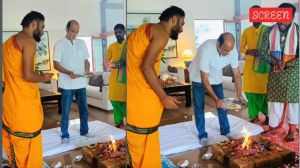‘Totally unacceptable’: Odisha govt asks Puri Jagannath authorities to probe Digha temple row
Attended ceremony on request of West Bengal CM: Temple servitor
 Servitors have also questioned whether stone idols of the sibling deities Jagannath, Balabhadra and Subhadra were being worshipped at the temple. Tradition dictates that the idols of these three deities must be made of neem wood.
Servitors have also questioned whether stone idols of the sibling deities Jagannath, Balabhadra and Subhadra were being worshipped at the temple. Tradition dictates that the idols of these three deities must be made of neem wood.
The Odisha government Friday asked authorities at the Puri Jagannath Temple to look into the controversies stemming from the recent inauguration of a replica of the 12th-century shrine in neighbouring West Bengal’s Digha.
In a letter to the Shree Jagannath Temple Administration’s chief administrator, Arabinda Kumar Padhee, Odisha Law Minister Prithiviraj Harichandan called for an “internal inquiry” into “naming the newly built Digha temple as Jagannath Dham, participation of servitors from Puri in the consecration ceremony of the new temple, and using the surplus sacred neem wood of Nabakalebara rituals to craft the idols for the new shrine.” Calling these “totally unacceptable”, he said that “conflicting information over Jagannath culture” had hurt the sentiments of devotees and 4.5 crore Odia people. He asked the Puri temple administration to consider initiating action.
The West Bengal government inaugurated the Jagannath temple at Digha on April 30. Servitors and devotees in Odisha have questioned the temple being named a “dham”, saying the title belongs to the original shrine at Puri. They have also questioned the participation of servitors from Puri temple in the Digha temple’s inauguration ceremony. Senior Puri Jagannath temple servitor Ramakrushna Dasmohapatra, among those who have faced criticism for participating in the Digha temple’s inauguration, said he attended the ceremony on the request of West Bengal CM Mamata Banerjee.
Servitors have also questioned whether stone idols of the sibling deities Jagannath, Balabhadra and Subhadra were being worshipped at the temple. Tradition dictates that the idols of these three deities must be made of neem wood.
Dasmohapatra said the stone idols had been in place at the new shrine for the past three months and were not being worshipped. “The idols were made from neem wood under my supervision at Puri. I then took the idols to Digha for the inaugural ceremony,” said the senior servitor. In the scriptures, Lord Jagannath is referred as Daru Brahma, with Daru referring to wood and Brahma meaning supreme power.







